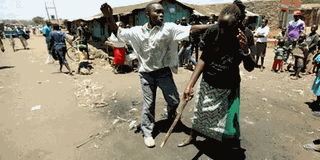Take gender violence fight to rural areas

What you need to know:
In some districts, especially where the presence of CSOs and development partners are limited, little or nothing is being done to observe the 16 Days of Activism Against Gender-Based Violence (GBV).
It is only one day to go the end of activities relating to 16 Days of Activism Against Gender-based Violence that kicked of November 25.
Actors, including local governments, civil society organisations, NGOs, and development partners, among others, are engaging in activities mostly in urban centres. In some districts, especially where the presence of CSOs and development partners are limited, little or nothing is being done to observe the 16 Days of Activism Against Gender-Based Violence (GBV).
I moved around a few villages in Nwoya District and noted that the residents were largely disconnected from engagements taking place at the district and national level. They cannot access newspapers or television, except for some families that may afford FM receivers. Moreover, local radios, mostly based in Gulu have not engaged much in 16 days of activism. From my experience as a local activist, GBV is more pronounced in the rural areas, which is dominated by illiterate or semi-literate population.
Most cases being heard by local council officials and traditional leaders in Acholi relates to GBV. GBV ruined many families in rural areas than in urban settings. It has devastating effects on the health of families, hence efforts being invested in rural development. Strategist, activists and other stakeholders should do things differently.
First, strengthen capacity of the community development offices (CDOs) at the sub-counties. These offices are barely financed. One community development officer said he could hardly reach all the parishes, let alone villages, to engage with community. Local governments should consider increasing financial allocation to CDOs at district and sub-county levels.
Second, transfer or initiate more activities in rural areas as opposed to Kampala-based activism. CSOs should look beyond their horizon by situating their activism in context instead of spending resources on colourful activities in urban centres where donors and government easily see them. In fact, every actor and supporters should move from the comfort of towns and cities to the hard-to-reach rural places where GBV thrives most.
Third, digitalise the fight against GBV. This is achievable in partnership with telecom companies through the Public-Private Partnership approach. Given that mobile phone usage is greatly improved among the rural population, short text GBV messages can be packaged in local languages and widely disseminated. If this is consistent, local perceptions, belief and practices will be impacted slowly leading to a positive societal shift towards gender rights, and a society free of violence against women and girls.
Why also not have a Presidential Initiative on GBV as it is the case for malaria and HIV? The initiative would focus on building and sustaining local capacity on combatting GBV among the rural population.
It is no longer a surprise that GBV affects every aspects of Uganda’s society, and thus, retards national growth and development. For as long as women and girls suffer from violence, the nation suffers too.
Novias Nansamba,
Gender activist


